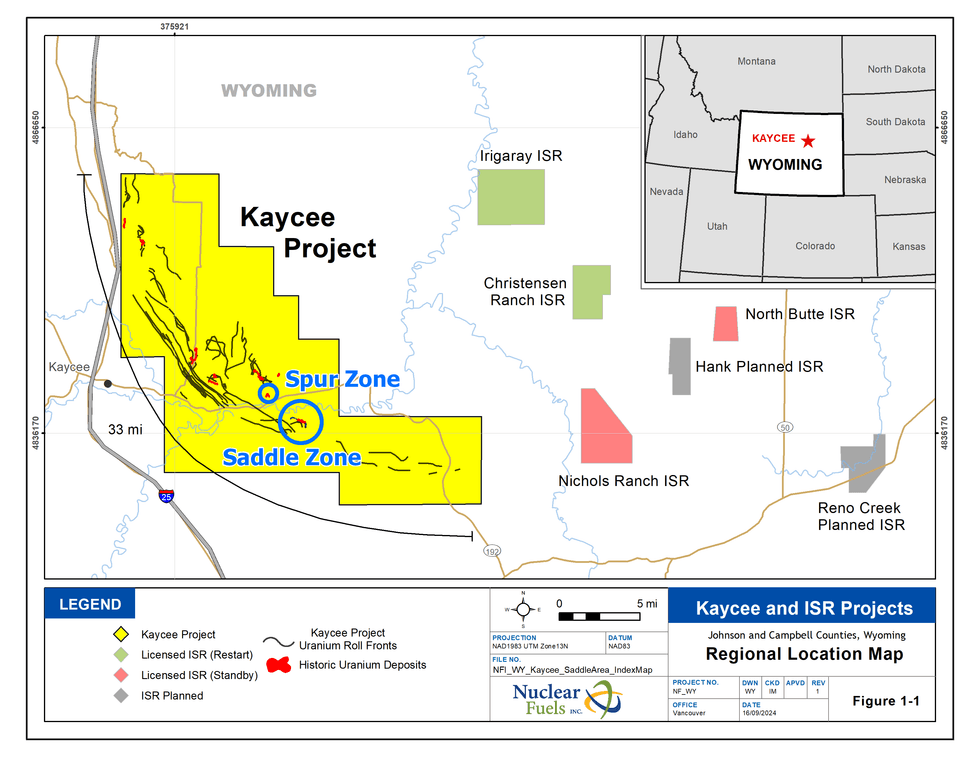Overview
Nuclear Fuels Inc. (CSE:NF,OTCQX:NFUNF) is a uranium exploration company advancing early-stage, district-scale In-Situ Recovery (ISR) amenable uranium projects towards production in the United States of America. Leveraging extensive proprietary historical databases and deep industry expertise, Nuclear Fuels is well-positioned in a sector poised for significant and sustained growth on the back of strong government support. Nuclear Fuels has consolidated the Kaycee district under single-company control for the first time since the early 1980s. Currently executing its second drill program at the Kaycee Project, the company aims to expand on historic resources across a 35-mile trend with over 430 miles of mapped roll-fronts defined by 3,800 drill holes. The company’s strategic relationship with enCore Energy Corp., America’s Clean Energy Company, offers a mutually beneficial “pathway to production,” with enCore owning an ~18 percent equity interest and retaining the right to back-in to 51 percent ownership in the flagship Kaycee Project in Wyoming’s prolific Powder River Basin.
Our industry-leading team is dedicated to building America’s uranium resources and ensuring a reliable domestic fuel supply for nuclear energy—always on, always available. ISR technology allows for non-invasive, environmentally friendly uranium extraction using groundwater and oxygen, combined with a proven ion exchange process, to recover the uranium efficiently and sustainably.
The company’s flagship project, Kaycee, is located in Wyoming’s Powder River Basin, the backbone of the United States’ domestic uranium production. With existing historic resources of nearly 2.5 million pounds (Mlbs) of uranium, the project has the potential to become a large-scale uranium producer. Eighty-nine drill holes were completed in 2023 focused on the Saddle Zone. Phase 2 of the drill program currently underway is focused on the Saddle and Spur Zones. It commenced on April 29, 2024, with an additional 700 permitted drill holes designed to expand the areas drilled in 2023 and define new mineralized zones along trend.
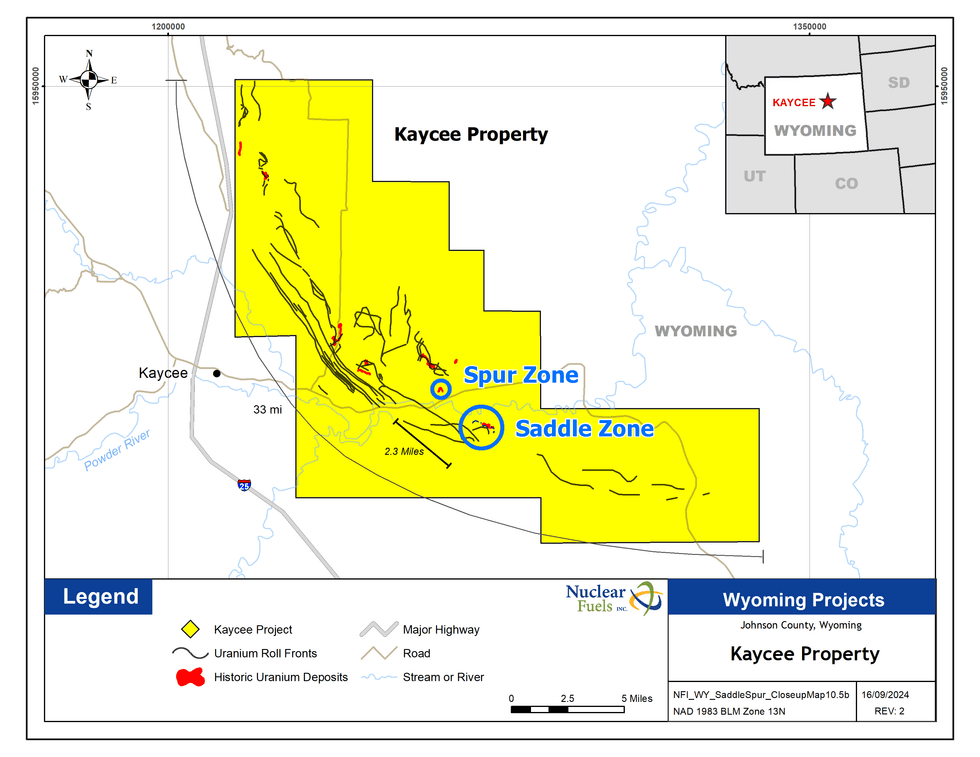
Wyoming is the USA’s leading uranium-producing state, home to the largest known uranium ore reserves in the US. Wyoming is also a jurisdiction that supports energy development, being among a handful of US states with an ‘Agreement State’ status, which provides for a “one-window” streamlined permitting program for new uranium projects.
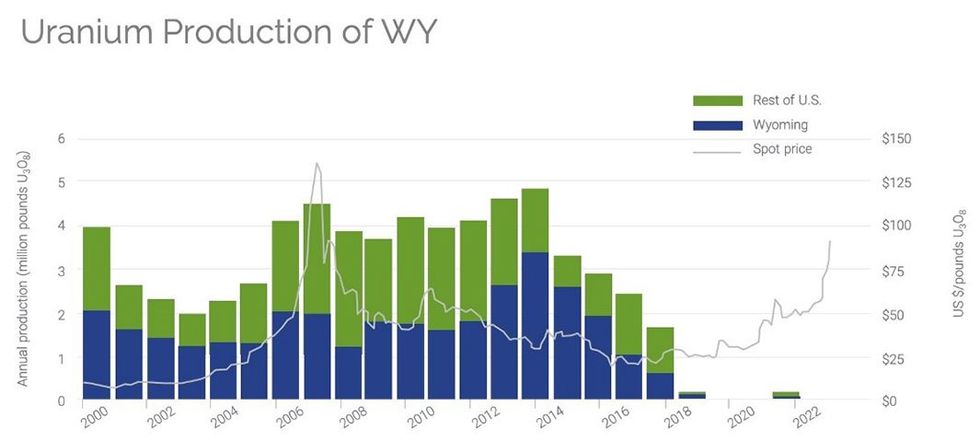
Nuclear Fuel’s Kaycee project is potentially amenable for in-situ recovery (ISR) extraction technology, an environmentally responsible and economically superior uranium extraction process. Over 60 percent of all uranium extractions globally use this technology.
In addition to the Kaycee project, some of the company’s other assets include the Bootheel project in Wyoming (uranium) and the Moonshine project in Arizona (uranium). Through this portfolio of projects, Nuclear Fuels is confident it can contribute to the U.S.’ need to develop a safe, environmentally superior, and reliable source of domestic uranium, thereby reducing foreign supply dependence and ultimately contributing to the global energy transition.
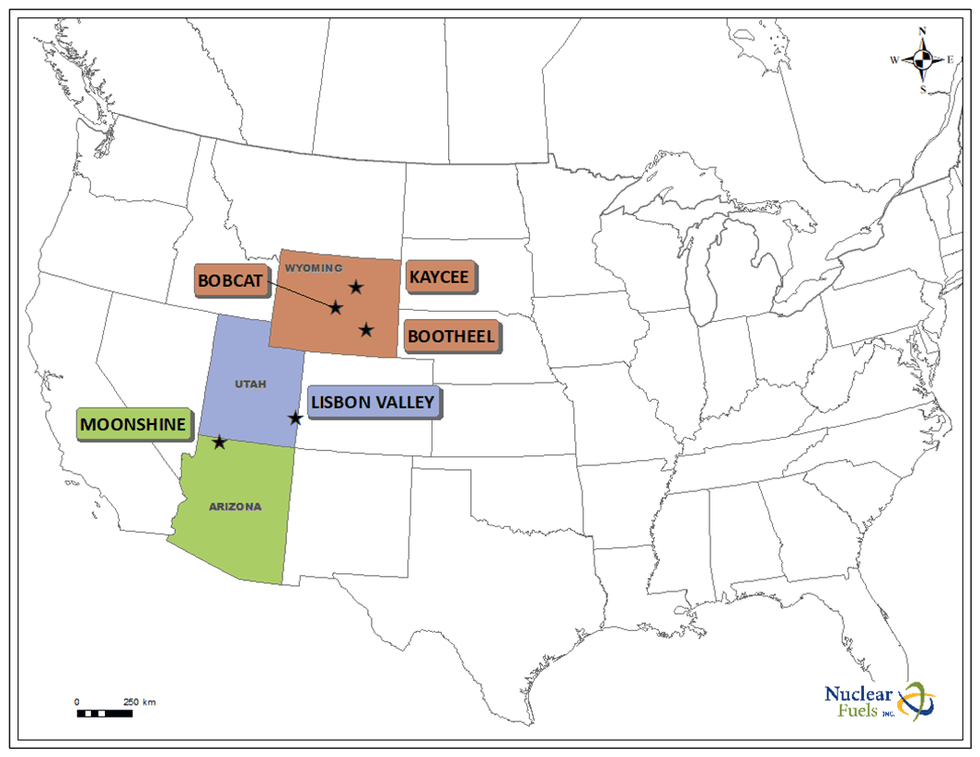
Assets in uranium mining jurisdictions
Some of the most important challenges faced by the world today are climate change and energy security. Nuclear energy can play an important role in addressing these concerns.
Nuclear energy is a clean and carbon-free energy source. It is the largest source of carbon-free electricity in the US, as it generates electricity without harmful pollutants such as nitrogen oxide, sulfur dioxide, particulate matter, or mercury. In addition, nuclear energy has a small land footprint meaning it can produce relatively large amounts of power using small land mass. Typically, a 1,000-MW nuclear plant requires around 1 square mile to operate. In comparison, wind farms require 360 times more land area to produce the same amount of electricity, and solar photovoltaic plants require 75 times more area, according to the Nuclear Energy Institute. Nuclear fuel is also extremely energy dense. For perspective, a half-inch-tall uranium pellet creates as much energy as 17,000 cubic feet of natural gas, 120 gallons (about 454.25 L) of oil, or 1 ton of coal. Lastly, the nuclear power industry has a strong safety culture; delivering power safely and efficiently, especially so in comparison to coal-fired power plants.
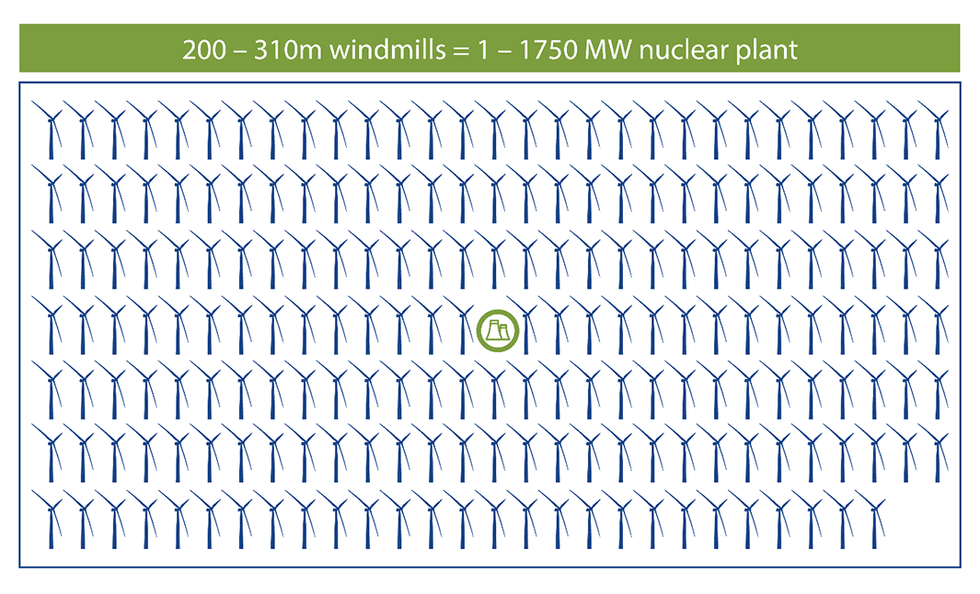
Given these benefits, the world today is experiencing a nuclear renaissance. Roughly 200 nuclear reactors are currently under construction or planned – an increase of more than 40 percent of the currently operating nuclear fleet. In Japan, 10 reactors have restarted, and 16 additional reactors have applied for restarts. Likewise, the UK plans to build eight new nuclear reactors to increase its energy production. Additionally, the US is heavily focused on nuclear energy, with several nuclear power plants in America currently undergoing the permitting process to restart power generation. Approximately 20 percent of electricity generated in the US comes from nuclear energy sources, according to data from the US Department of Energy. However, about 95 percent of the uranium that fuels America’s nuclear reactors is imported. The continued increase in the price of uranium is fueling the drive to accelerate uranium exploration in the US to boost domestic production.
To produce large amounts of nuclear energy, the US needs domestically produced uranium fuel. Currently, the majority of uranium is imported from foreign producers such as Russia, Kazakhstan and China. To reduce dependence on foreign uranium supply, the US is seeking to strengthen its domestic supply sources. Nuclear Fuels is well positioned to become a leading domestic uranium exploration company with a potential pathway to production with enCore Energy, with the Kaycee Project in Wyoming.
Wyoming is a proven and effective uranium permitting jurisdiction. Its status as an Agreement State ensures permitting and advancing uranium projects are more efficient and streamlined compared to most other states. It is also important to note that most uranium production in Wyoming, especially in the Powder River Basin, involves the ISR extraction method. Wyoming hosts at least 10 ISR operations that have produced more than 45 Mlbs of U3O8.
What is in-situ recovery?
In-situ recovery (ISR) offers a minimally intrusive, eco-friendly and economically competitive approach to mineral extraction. It’s been proven a successful technique for mining uranium, especially from lower-grade deposits that might not warrant conventional open pit or underground mining due to costs. Unlike traditional mining, ISR doesn’t involve open pits, waste dumps or tailings, making it more environmentally friendly. This method also streamlines the permitting, development, and remediation processes. With ISR, uranium is extracted without disturbing the surface, and once the process is complete, the land is restored to its original state and purpose.
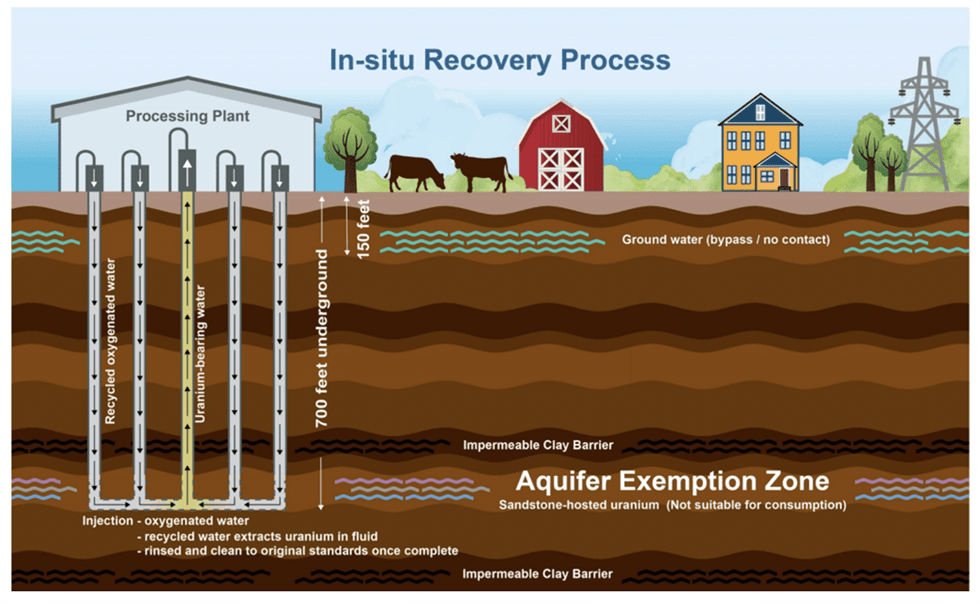
Since its development in the 1960s, ISR technology has evolved significantly. Today, it’s a controllable, safe and benign uranium production method that is highly regulated in the US. ISR currently accounts for about 70 percent of global uranium production. Some nations, like Kazakhstan and Australia, still employ strong chemicals like sulfuric acid for extraction. Many companies operating in the US opt for a mix of oxygen and sodium bicarbonate in the local groundwater, which extracts uranium with minimal environmental impact and at a near-neutral pH.
With ISR, uranium extraction is accomplished in liquid form through injection and recovery wells. Oxygen is injected with water and no toxic chemicals are used. Compared to conventional mining, it saves a significant amount of water. The use of this technology leads to minimal surface disruption, no tailings and no waste piles. Land and water revert to the original use category once the extraction is completed.
Company Highlights
- Consolidation of the 35-mile trend of the Kaycee Project in Wyoming’s prolific Powder River Basin.
- Permitted 700 hole drill program underway at the Kaycee Project to expand on historic resources across a 35-mile trend with over 430 miles of mapped roll-fronts defined by 3,800 drill holes.
- Strategic relationship with enCore Energy Corp., America’s Clean Energy Company, for a pathway to production;
- Leveraging extensive proprietary historical databases to build a long-term pipeline of projects in progressive jurisdictions.
- The company is led by industry experts with extensive experience and credentials in uranium exploration and development, and all aspects of ISR uranium operations.
- In the rising global demand for carbon-free sources of energy production, Nuclear Fuels is well positioned to contribute, through exploration, to a reliable supply of domestic uranium to fuel America’s nuclear energy.
- The US is the world’s largest consumer of nuclear energy, with 20 percent of its electric grid fueled by nuclear energy, yet most of its uranium fuel is imported.
- Uranium prices continue to rise due to consistent and growing uranium demand and constraints on current production capacity.
- enCore Energy is the company’s largest shareholder with an 18.3 percent stake, while management and other insiders hold 6.7 percent, with CEO Greg Huffman holding 3.2 percent of this.
Key Project
Kaycee Project, Wyoming
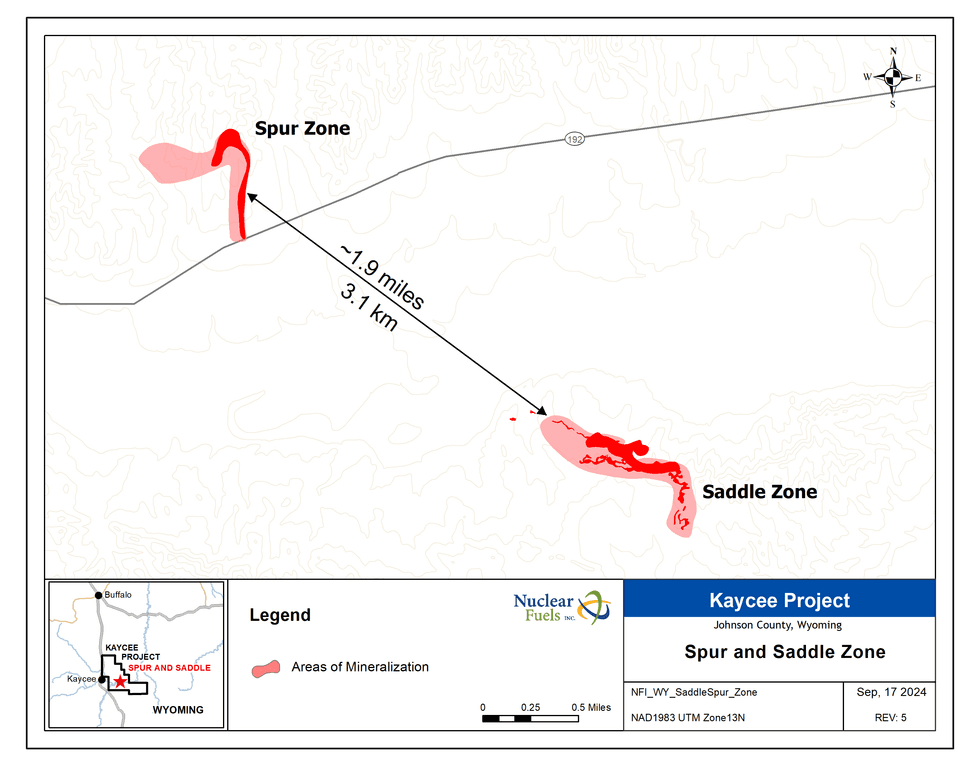
The Kaycee project is the company’s flagship asset. It is the largest ISR exploration project in Wyoming’s Powder River Basin (PRB) and covers a 35-mile mineralized trend with over 430 miles of identified roll fronts and over 55 square miles of mineral rights. The project comprises three historically productive sandstone formations – Wasatch, Fort Union and Lance – that are mineralized and potentially amenable to ISR extraction. For the first time since the 1980s, the Kaycee Project is now held by a single company.
With over 3,800 drill holes, historic drilling has confirmed uranium mineralization in all three historically productive sandstones within the PRB, occurring over more than 1,000 feet of vertical section. The majority of the project is not well-explored, with drilling concentrated on approximately 10 percent of the area. The company’s Phase 1 drilling program, conducted in 2023, focused on the Saddle Zone which hosts a historic resource of 519,000 lbs. The initial results from the first 12 holes were encouraging. High-grade mineralization was encountered in five holes with grade thickness (GT) ranging from 0.441 to 0.908. The highest-grade intercept is 3 feet of 0.240 percent e U3O8. Five holes have a GT of >0.3 which is considered suitable for inclusion in a wellfield.
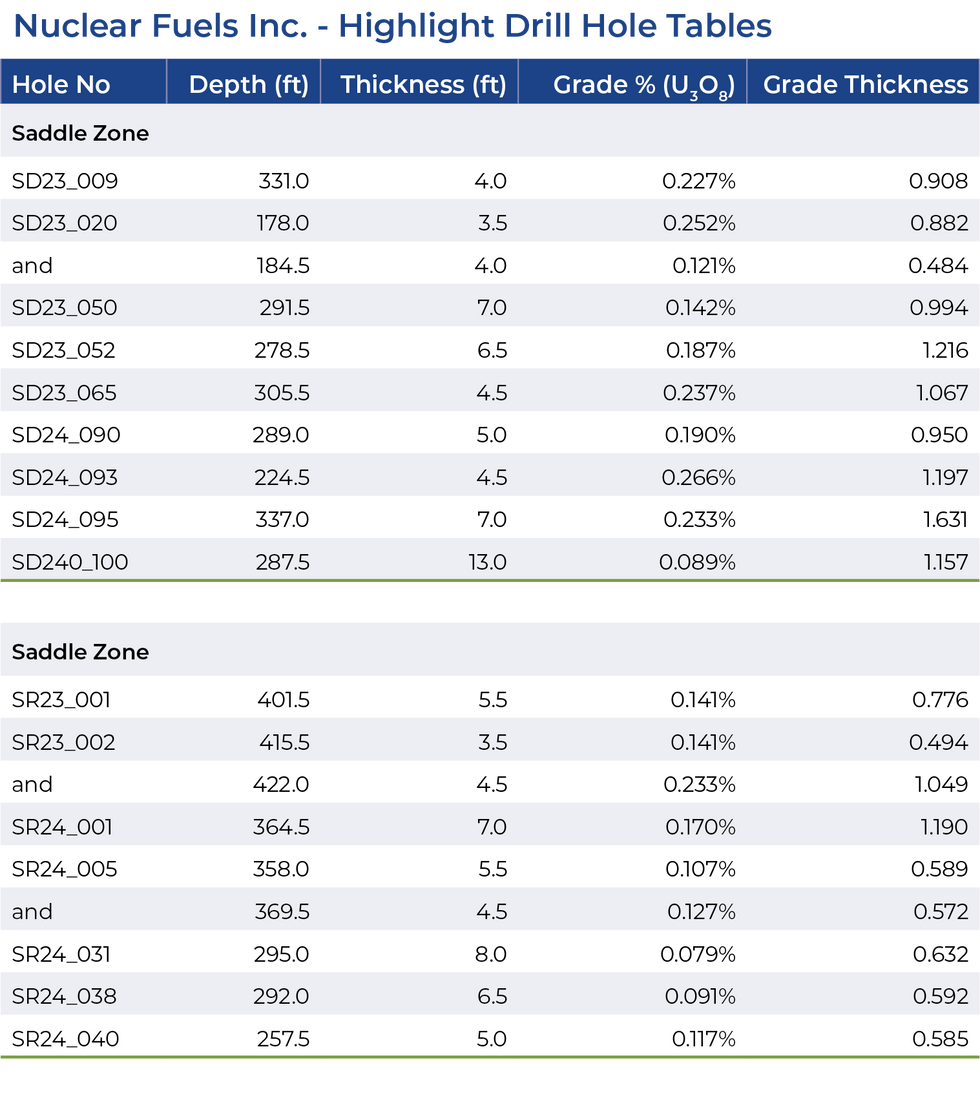
Table of Significant Results
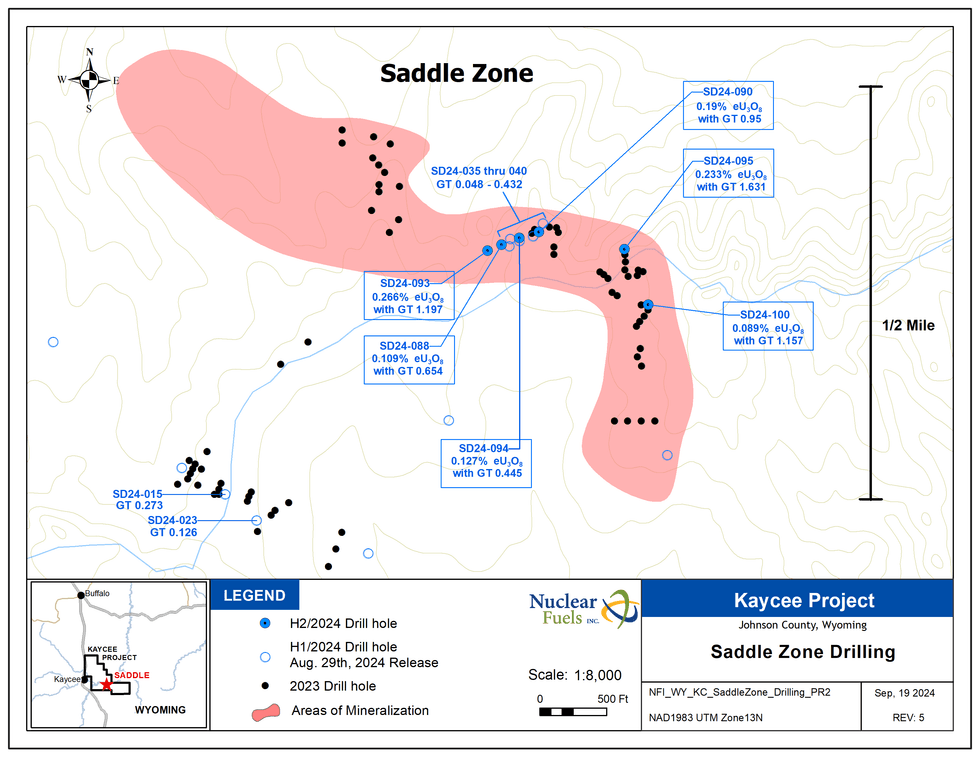
Phase 1 drilling during 2023 successfully confirmed and expanded historic resources returning grades ranging from trace to 6.5 feet at 0.187 percent U3O8 (Gamma log) with a grade thickness of 1.216; Phase 2 of the drill program, commenced on April 29, 2024, focused on the Saddle and Spur Zones to expand historic uranium mineralization at depth and expand mineralization along trend and on other high-priority targets identified with an additional 700 permitted drill holes.
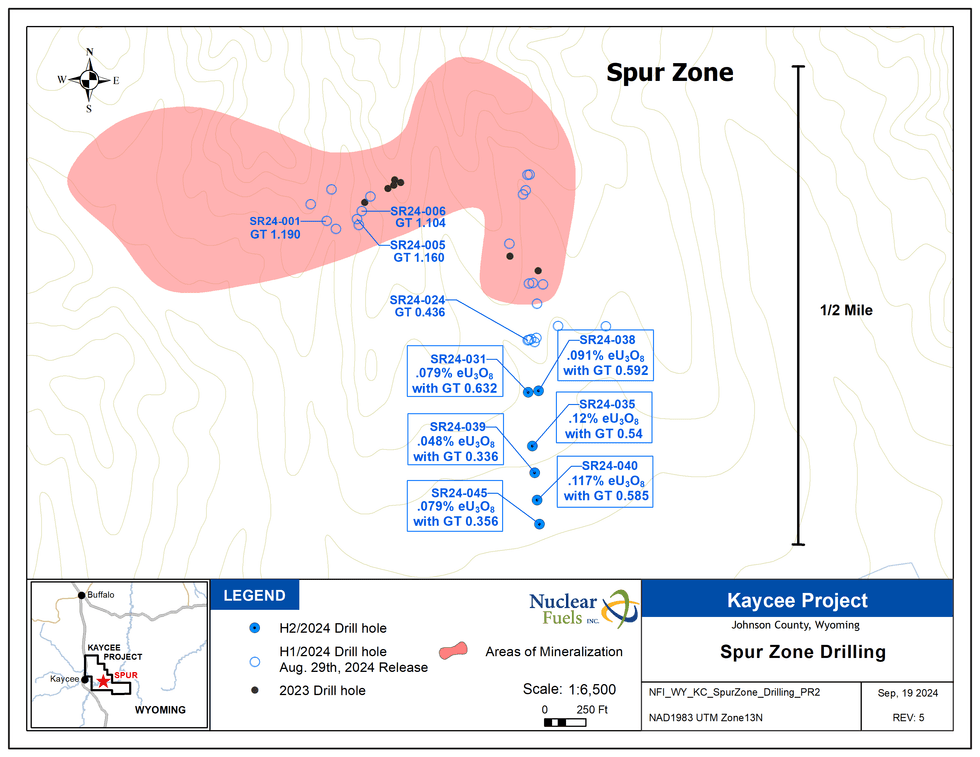
Nuclear Fuels acquired this project from enCore Energy, which, upon Nuclear Fuels establishing a minimum of an NI 43-101 compliant resource of 15 Mlbs U3O8, retains a back-in right for 51 percent of the project by paying 2.5 times the exploration costs and financing the project to production. This provides a clear path to production in case of major discovery at Kaycee.
Technical Report
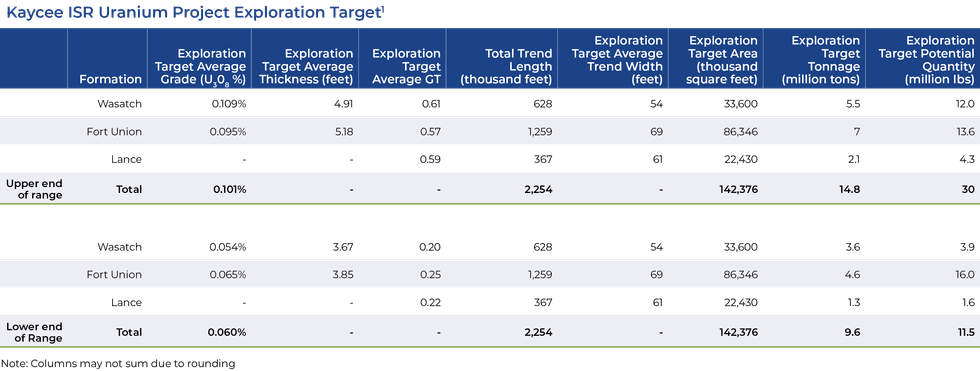
The Technical Report, prepared by WWC Engineering, has identified an exploration target of 11.5 to 30 million pounds of uranium “U3O8) supported by available historical data from previous operators and recent exploration recently conducted by Nuclear Fuels.
Highlights of the Technical Report:
- An exploration target of 11.5 to 30 million pounds uranium (U3O8) at average grades of 0.06 percent to 0.10 percent;
- A more extensive, in-depth review of historical data identified approximately 430 miles of roll fronts, an increase from the +110 miles previously outlined. Approximately 10 percent of the mapped redox trends have been explored with close-spaced drilling;
- The identification of the presence of multiple stacked roll fronts in each of the three stratigraphic formations that are known to host uranium mineralization;
- Indication the uranium mineralization lying under the water table may be amenable to In-Situ Recovery (ISR), based on historical metallurgical and mineral processing test work. ISR is an economical and environmentally responsible means of extracting uranium through wellfield technology and the use of oxygenated water, eliminating the use of conventional mining techniques;
- Details regarding the eleven (11) reported areas of historical uranium resources occurring at depths that range from less than 50 to 1,300 feet with a shallow water table typically lying between 50 and 250 feet.
- The Technical Report recommended that the Company should continue the current drilling program to delineate mineralization and explore for additional mineralized areas on the Project. In addition, the Technical Report recommended that the Company should prepare a classified mineral resource estimate for the Project, contingent on positive results of the drilling program.
Other Projects
Bootheel Project, Wyoming
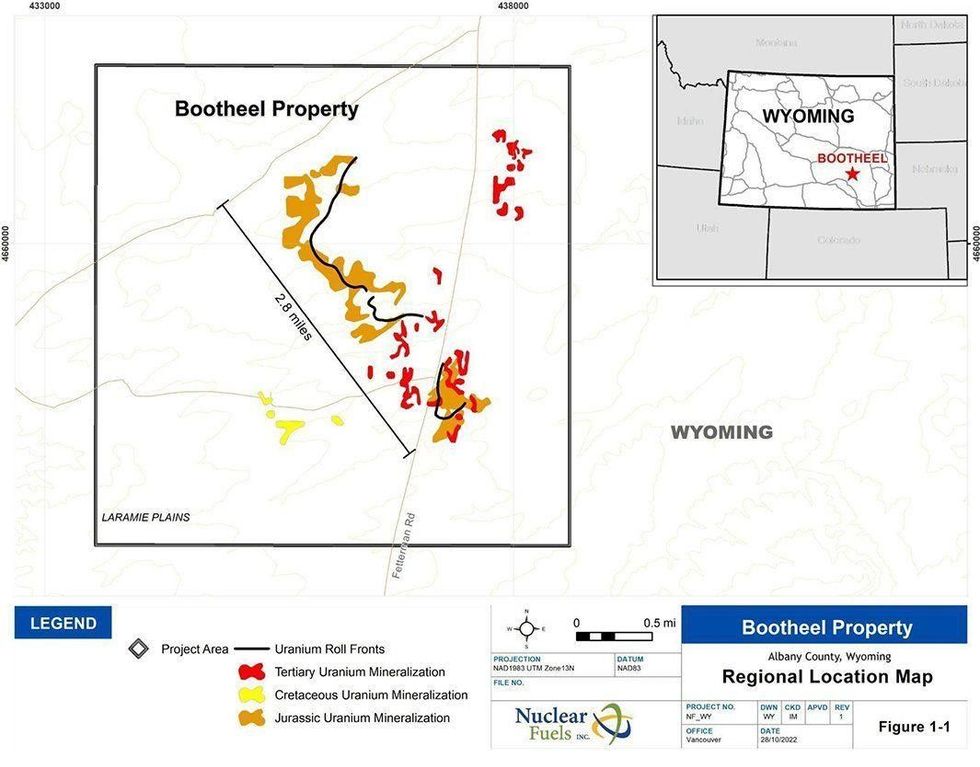
The Bootheel project in Southeast Wyoming consists of roll-front mineralized zones identified in three distinct, stacked sandstone formations. Historic metallurgical testing has indicated better-than-average uranium recovery kinetics and aquifer rehabilitation. A historic NI 43-101 report in 2007, includes an indicated resource of 1.443 million (Mt) @ 0.038 percent U3O8 for 1.089 Mlbs U3O8, and inferred resource of 4.399 Mt @ 0.037 percent U3O8 for 3.249 Mlbs U3O8.
Bobcat Project, Wyoming
This project is located in the Shirley Basin, 25 miles south of Casper, Wyoming in Albany County. The Shirley Basin is a proven and prolific producer of uranium credited with over 84 million pounds produced between 1959 and 1992 from producers including Getty Oil Company, Texaco, Pathfinder Mines Corporation, and Cogema Mining. Moreover, the Shirley Basin is home to the first commercial use of the ISR technique to extract uranium from sandstone-host deposits.
Moonshine Project, Arizona
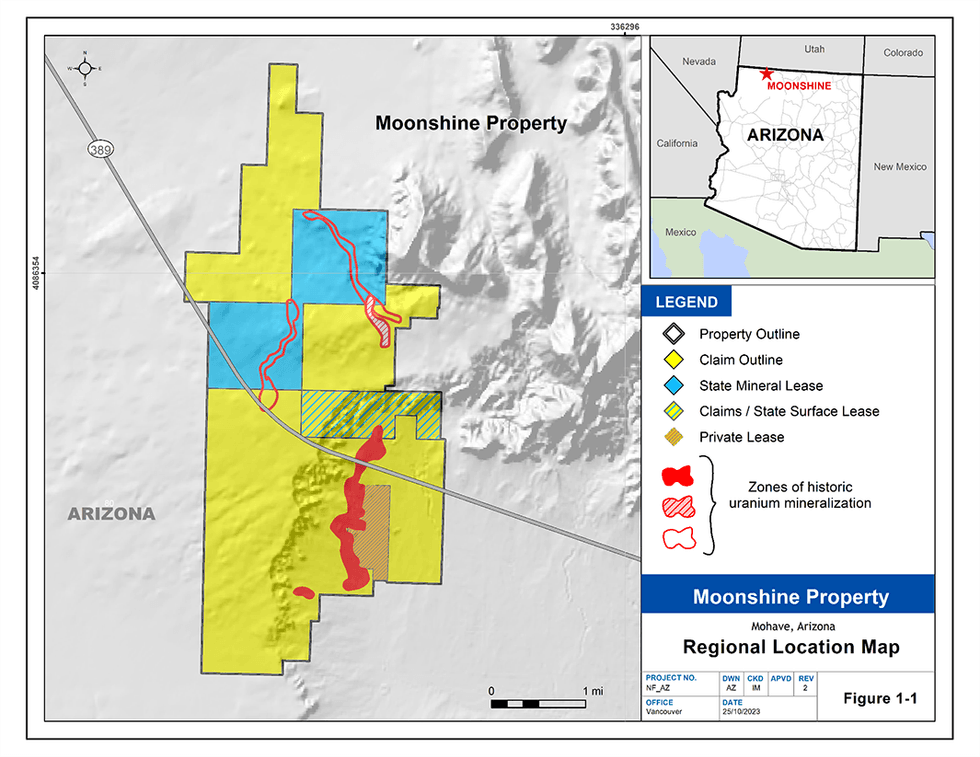
The Moonshine Springs project is in Mohave County, Arizona. The project comprises approximately 1,000 acres, including 23 owned lode mining claims along with seven lode mining claims and 320 acres of fee land held under lease. This property was earlier explored during the 1970s and 1980s by Exxon Corp and later by Pathfinder.
This project consists of at least three stratigraphic zones, where the sandstone-hosted uranium occurs. The upper two zones lie at an average depth of 170 feet and are considered open pit candidates with the lower zone lying at a depth of 760 feet. The project is amenable to ISR with a historic resource of 2.4 Mlbs grading 0.16
Lisbon Valley Project, Utah
This project is in the Lisbon Valley Uranium District in Southeast Utah and covers approximately 2,211 acres. The project has two claim blocks – LS and JB. The LS claim group is located southeast and adjacent to the Lisbon mine, which was operational between 1972 and 1988, producing approximately 22 Mlbs of U3O8. Historical drilling at LS claim dating back to 2007 reported uranium mineralization amounting to 17.5 feet grading 0.11 percent U3O8.
Management Team
William M. Sheriff – Chairman
William Sheriff is the founder and presently serves as the executive chair of enCore Energy Corp., a leader in ISR uranium production. He was a pioneer in the uranium renaissance as co-founder and chairman of Energy Metals, which was acquired by Uranium One for $1.8 billion and owns the largest domestic uranium resource base in US history.
Gregory Huffman – Chief Executive Officer, President and Director
Gregory Huffman brings more than two decades of mining analysis and equity finance experience with a focus on uranium and other energy-related metals. Huffman’s diverse background includes roles in mining specialty sales, fund management, and equity research in the metals and mining sector. In his career, he has been instrumental in leading cross border coordination in global mining financial matters, including his work as a mining analyst focused on uranium from 2004 to 2007. His most recent experience, from 2016 to 2024, was as the global head of mining sales at Canaccord Genuity where he employed his broad range of geological and financial skills to evaluate mining companies exploring, developing, and producing precious, base and energy-related metals, including uranium. Huffman is known for his insightful industry publications, the “Canaccord Genuity High Grade Mining Minute” and “Huffer’s High Grade Nuggets.”
Eugene Spiering – Director
Eugene Spiering is a registered geologist with more than 30 years of experience and recently served as VP of exploration for Quaterra Resources, where he led the discovery of the only two uranium deposits in Arizona. He also worked on the Kaycee Uranium District in the early 1980s.
David Miller – Director
David Miller is a businessman, professional economic geologist, and a past member of the Wyoming State Legislature. He previously served as the chief executive officer of Strathmore Minerals before its merger with Energy Fuels in 2013. His career has spanned more than 40 years and started with Utah International in the US, which evolved into Orano Group, the French nuclear power conglomerate.
Richard Munson – Director
Richard Munson has been active in the natural resources business for more than 35 years, starting as a natural resources lawyer specializing in taxation. He moved to the private sector in the mid-80s when he joined the Energy Fuels companies owned by John Adams. Energy Fuels Nuclear became the largest US uranium producer in the late 1980s and early 1990s. In 1999, Munson and John Adams co-founded ETK, which then owned the Toroparu gold-copper project in Guyana, South Africa. Munson continues to be active in the international resource sector.
Brahm Spilfogel – Director
Brahm Spilfogel is an award-winning financial executive with over 25 years of experience in resource portfolio management. He recently retired from RBC Global Asset Management where he served as managing director and senior portfolio manager, co-managing a number of portfolios including the RBC Global Precious Metal Fund, RBC Global Resources Fund, and the RBC Small and Mid-Cap Resources Fund, with assets exceeding $2 billion. As one of Canada’s most well-regarded resource portfolio managers, Spilfogel has actively engaged with corporate boards, offering strategic insights and contributing to governance, safety, and sustainability discussions. His deep expertise in the resources sector extends to financial analysis, mergers and acquisitions, and capital markets.
Monty Sutton – Chief Financial Officer
Monty Sutton brings more than 35 years of experience in public markets, corporate governance, senior administration and accounting and has served on the management teams and boards for many private and publicly traded companies. Sutton has held positions as senior management accountant for MacMillan Bloedel, investment advisor, insurance specialist, corporate development manager and most recently chief financial officer.
Mark Travis – Project Manager
Mark Travis has over 17 years of mineral industry experience in a variety of different settings including both energy and precious metals. He was instrumental in the Strathmore Minerals development of the Gas Hills Wyoming properties during the 2006-2013 uranium cycle. He is the director of the Geological Society of Nevada and the Nevada Mineral Exploration Coalition and is a certified professional geologist through AIPG.
Credit: Source link



